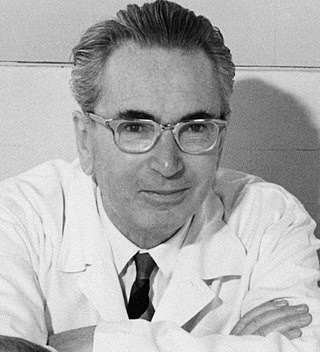Paradoxical intention (PI) is a psychotherapeutic technique used to treat recursive anxiety by repeatedly rehearsing the anxiety-inducing pattern of thought or behaviour, often with exaggeration and humor. Paradoxical intention has been shown to be effective in treating psychosomatic illnesses such as chronic insomnia, public speaking phobias, etc. by making patients do the opposite of their hyper-intended goal, hindering their ability to perform the activity.

The human condition can be defined as the characteristics and key events of human life, including birth, learning, emotion, aspiration, morality, conflict, and death. This is a very broad topic that has been and continues to be pondered and analyzed from many perspectives, including those of art, biology, literature, philosophy, psychology, and religion.

Viktor Emil Frankl was an Austrian psychiatrist and Holocaust survivor, who founded logotherapy, a school of psychotherapy that describes a search for a life's meaning as the central human motivational force. Logotherapy is part of existential and humanistic psychology theories.

Man's Search for Meaning is a 1946 book by Viktor Frankl chronicling his experiences as a prisoner in Nazi concentration camps during World War II, and describing his psychotherapeutic method, which involved identifying a purpose to each person's life through one of three ways: the completion of tasks, caring for another person, or finding meaning by facing suffering with dignity.
Logotherapy was developed by neurologist and psychiatrist Viktor Frankl and is based on the premise that the primary motivational force of an individual is to find a meaning in life. Frankl describes it as "the Third Viennese School of Psychotherapy" along with Freud's psychoanalysis and Adler's individual psychology.
Existential psychotherapy is a form of psychotherapy based on the model of human nature and experience developed by the existential tradition of European philosophy. It focuses on concepts that are universally applicable to human existence including death, freedom, responsibility, and the meaning of life. Instead of regarding human experiences such as anxiety, alienation and depression as implying the presence of mental illness, existential psychotherapy sees these experiences as natural stages in a normal process of human development and maturation. In facilitating this process of development and maturation existential psychotherapy involves a philosophical exploration of an individual's experiences while stressing the individual's freedom and responsibility to facilitate a higher degree of meaning and well-being in his or her life.

In psychology and psychotherapy, existential crises are inner conflicts characterized by the impression that life lacks meaning or by confusion about one's personal identity. Existential crises are accompanied by anxiety and stress, often to such a degree that they disturb one's normal functioning in everyday life and lead to depression. This negative attitude towards life and meaning reflects various positions characteristic of the philosophical movement known as existentialism. Synonyms and closely related terms include existential dread, existential vacuum, existential neurosis, and alienation. The various aspects associated with existential crises are sometimes divided into emotional, cognitive, and behavioral components. Emotional components refer to the feelings they provoke, such as emotional pain, despair, helplessness, guilt, anxiety, or loneliness. Cognitive components encompass the problem of meaninglessness, the loss of personal values or spiritual faith, and reflections about one's own mortality. Outwardly, existential crises often express themselves in addictions, anti-social and compulsive behavior.
Meaning in existentialism is descriptive; therefore it is unlike typical, prescriptive conceptions of "the meaning of life". Due to the methods of existentialism, prescriptive or declarative statements about meaning are unjustified. The root of the word "meaning" is "mean", which is the way someone or something is conveyed, interpreted, or represented. Each individual has his or her own form of unique perspective; meaning is, therefore, purely subjective. Meaning is the way something is understood by an individual; in turn, this subjective meaning is also how the individual may identify it. Meaning is the personal significance of something physical or abstract. This would include the assigning of value(s) to such significance.
What was previously known as melancholia and is now known as clinical depression, major depression, or simply depression and commonly referred to as major depressive disorder by many health care professionals, has a long history, with similar conditions being described at least as far back as classical times.
Existential counselling is a philosophical form of counselling which addresses the situation of a person's life and situates the person firmly within the predictable challenges of the human condition.
Self-transcendence is a personality trait that involves the expansion or evaporation of personal boundaries. This may potentially include spiritual experiences such as considering oneself an integral part of the universe. Several psychologists, including Viktor Frankl, Abraham Maslow, Pamela G. Reed, C. Robert Cloninger, Lars Tornstam, and Scott Barry Kaufman have made contributions to the theory of self-transcendence.

The Doctor and the Soul is a book by Viktor E. Frankl, the Vienesse psychiatrist and founder of logotherapy.
Noogenic neurosis is a term in logotherapy denoting a form of neurosis stemming from "existential frustration". The term was coined by Dr. Viktor Frankl, the founder of logotherapy.
The tragic triad is a term used in logotherapy, coined by Dr. Viktor Frankl. The tragic triad refers to three experiences which often lead to existential crisis, namely, guilt, suffering or death. The concept of the tragic triad is used in identifying the life meanings of patients, or the relatives of patients, experiencing guilt, suffering or death. These life meanings are analyzed using logotherapy's existential analysis with the intent of assisting the patient overcome their existential crisis by discovering meaning or purpose in the experience.

Existential Psychotherapy is a book about existential psychotherapy by the American psychiatrist Irvin D. Yalom, in which the author, addressing clinical practitioners, offers a brief and pragmatic introduction to European existential philosophy, as well as to existential approaches to psychotherapy. He presents his four ultimate concerns of life—death, freedom, isolation, and meaninglessness—and discusses developmental changes, psychopathology and psychotherapeutic strategies with regard to these four concerns.

Paul T. P. Wong is a Canadian clinical psychologist and professor. His research career has gone through four stages, with significant contributions in each stage: learning theory, social cognition, existential psychology, and positive psychology. He is most known for his integrative work on death acceptance, meaning therapy, and second wave positive psychology. He has been elected as a fellow for both the American Psychological Association and the Canadian Psychological Association.
Joseph B. Fabry was an Austrian-American writer associated with the logotherapy movement.
Second wave positive psychology is a therapeutic approach in psychology that attempts to bring out the best in individuals and society by incorporating the dark side of human existence through the dialectical principles of yin and yang. This represents a distinct shift from focusing on individual happiness and success to the dual vision of individual well-being and collective humanity. PP 2.0 is more about bringing out the "better angels of our nature" than achieving optimal happiness or personal success. The approach posits that empathy, compassion, reason, justice, and self-transcendence will improve humans, both individually and collectively. PP 2.0 centers around the universal human capacity for meaning-seeking and meaning-making in achieving optimal human functioning under both desirable and undesirable conditions. This emerging movement is a response to perceived problems of what some have called "positive psychology as usual."
The International Network on Personal Meaning (INPM) is a nonprofit organization devoted to advancing meaning-centred research and interventions. It was founded by Paul T. P. Wong in 1998. Inspired by Viktor Frankl's logotherapy, Wong wanted to expand Frankl's vision to include the contemporary positive psychology movement. Therefore, the INPM provides a "big tent" for both existential-humanistic psychologists and positive psychologists in their biennial International Meaning Conferences and their journal, the International Journal of Existential Psychology and Psychotherapy.

Jürgen Kriz is a German psychologist, psychotherapist and emeritus professor for psychotherapy and clinical psychology at the Osnabrück University, Germany. He is a prominent thinker in systems theory and the founder of the person-centered systems theory – a multi-level concept for the understanding of processes in psychotherapy, counseling, coaching and clinical psychology.







